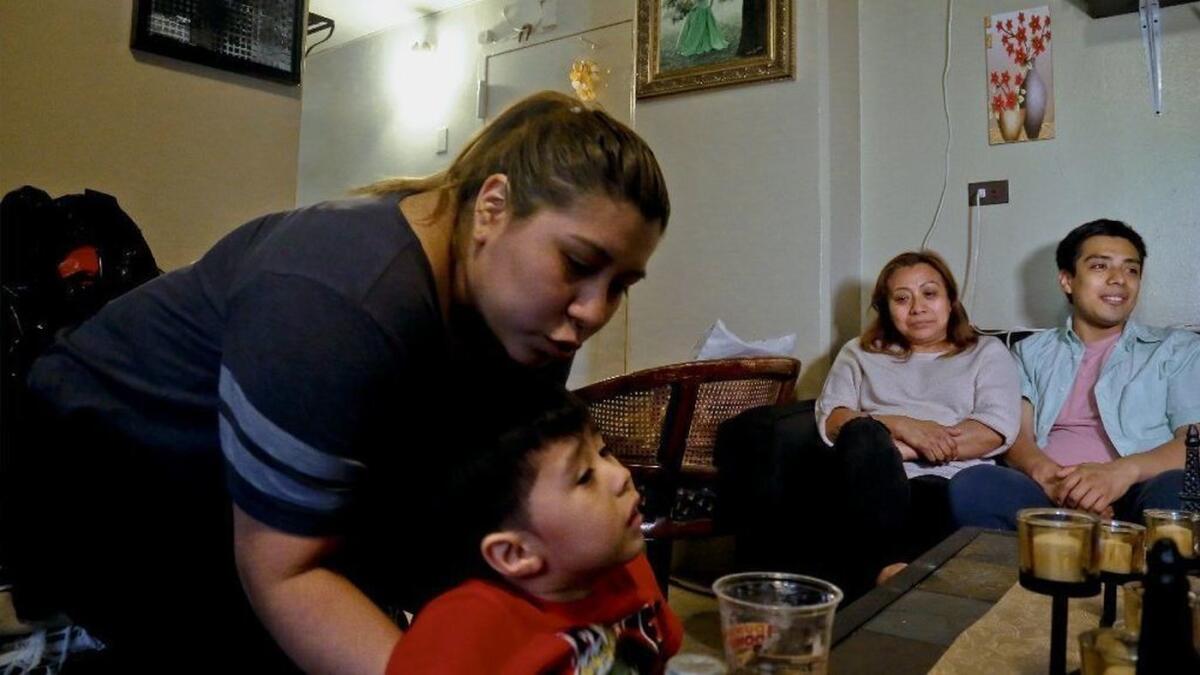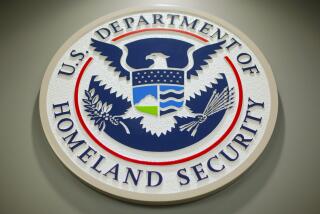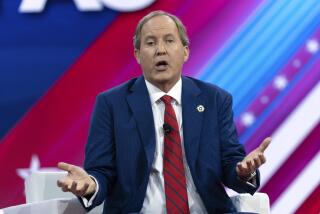Patient advocates decry Trump administration move to restrict immigrants’ access to healthcare

Health officials, physician groups, hospitals and patient advocates across the country are strongly condemning the Trump administration’s proposal to restrict immigrants’ access to green cards if they use the healthcare safety net, warning of risks to public health and government finances.
“This is not only bad for the health and well-being of the people most directly affected, it is bad for all of us,” said Dr. Georges Benjamin, head of the American Public Health Assn., one of scores of healthcare groups to criticize the administration’s proposal.
“We hope that this heartless, punitive public policy will be reversed,” Benjamin said.
Among the major groups calling on the Trump administration to withdraw the so-called public charge proposal are the American Medical Assn., the March of Dimes and the American Hospital Assn.
“Many of the patients served by our members almost certainly will avoid needed care from their trusted providers, jeopardizing their own health and that of their communities,” six leading physician groups said in a joint statement.
The groups include the American Academy of Family Physicians, the American Academy of Pediatrics, the American College of Obstetricians and Gynecologists, the American College of Physicians and the American Psychiatric Assn.
The Trump administration recently announced a proposed regulation that would allow federal immigration authorities to deny green cards to immigrants who receive certain forms of government assistance.
These include housing vouchers, food aid often known as food stamps, and Medicaid, the half-century-old government health insurance program for the poor.
“Those seeking to immigrate to the United States must show they can support themselves financially,” Homeland Security Secretary Kirstjen Nielsen said in a statement announcing the proposed rule, adding it would “promote immigrant self-sufficiency and protect finite resources by ensuring that they are not likely to become burdens on American taxpayers.”
The proposed regulation was formally posted Wednesday.
The United States for more than two centuries has placed restrictions on immigrants deemed to be a “public charge.”
But the government officials long viewed health programs as important tools for protecting the well-being of citizens and noncitizens alike.
“There was an understanding that the health of everyone was a public good,” said Torrie Hester, an immigration historian at St. Louis University.
So while the U.S. Immigration and Naturalization Service in 1999 issued guidance that it would consider immigrants’ use of cash welfare benefits in determining applications for permanent residency, the federal agency specifically indicated that use of Medicaid and the Children’s Health Insurance Program, or CHIP, would not hurt applicants.
The new Trump administration policy maintains the protection for use of CHIP, which is available to working-class families who often earn too much to qualify for fully subsidized Medicaid coverage but too little to afford commercial health insurance.
But for the first time, families’ use of Medicaid could be counted against them.
That may prove particularly problematic for immigrant families whose children are U.S. citizens.
In 2016, more than 10 million citizen children in the U.S. had at least one noncitizen parent, according to an analysis of census data by the nonprofit Kaiser Family Foundation.
Nearly 90% of these children live in a household where at least one parent is a full-time worker. But because these parents are often in low-wage jobs, more than half the children – about 5.8 million -- rely on Medicaid or CHIP for health coverage, the analysis found.
It’s unlikely all immigrant parents of these children will withdraw them from government coverage if the Trump administration finalizes its new public charge regulation.
But pediatricians, public health officials and other experts warn that coverage losses and health problems could be substantial if even a fraction of the families drop Medicaid or CHIP coverage.
In the proposed regulation, the Trump administration itself acknowledges a host of potentially adverse effects for immigrants such as “worse health outcomes, including increased prevalence of obesity and malnutrition, especially for pregnant or breastfeeding women, infants, or children, and reduced prescription adherence.”
Dr. Lanre Falusi, a Children’s National Medical Center pediatrician who sees patients in a largely immigrant neighborhood of Washington, said she and her colleagues are already seeing signs that immigrant families are reconsidering their participation in some health assistance programs.
“All my families are very committed to their children’s health,” Falusi said. “But this puts them in a very difficult position.”
Even skipping regular checkups can be very dangerous for children, Falusi explained, noting that pediatricians use well-child visits to screen children for disease, depression and healthy development.
There are broader public health risks for the general population if immigrant families begin to forgo medical care, warned Dr. Barbara L. McAneny, president of the American Medical Assn.
“The potential policy changes will likely reverse the public health gains we have made in the last several decades in areas such as vaccinations [and] control of infectious diseases,” she said.
Hospital leaders also cautioned that if immigrant families do not seek regular medical care, they are more likely to end up in the hospital with more serious and costly illnesses that others would have to pay for.
“It would drive higher levels of uncompensated hospital care and, ultimately, higher costs for insured patients and taxpayers,” said Dr. Bruce Siegel, president of America’s Essential Hospitals, whose members include medical centers that care for largely poor patients.
The Trump administration in its proposed regulation acknowledged the same risks, noting the likelihood of “increased use of emergency rooms and emergent care as a method of primary healthcare due to delayed treatment” and “increases in uncompensated care in which a treatment or service is not paid for by an insurer or patient.”
Finally, the administration conceded that the rule “could lead to … increased rates of poverty and housing instability; and reduced productivity and educational attainment.”
More stories from Noam N. Levey »
More to Read
Get the L.A. Times Politics newsletter
Deeply reported insights into legislation, politics and policy from Sacramento, Washington and beyond. In your inbox three times per week.
You may occasionally receive promotional content from the Los Angeles Times.










